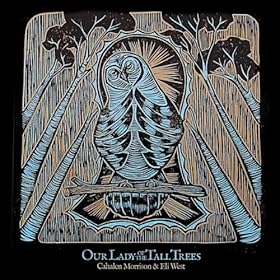| Chris Brashear, Heart of the Country (Dog Boy, 2012) Cahalen Morrison & Eli West, Our Lady of the Tall Trees (independent, 2012)
As with the finest of the current generation of folk performers, Morrison & West seamlessly link older traditions to inventive arrangements. Though Our Lady -- their second record; I have not heard their first -- is just the two of them playing an assortment of stringed instruments, not least the clawhammer banjo on which both are proficient, the sound seems full. The original songs (there are two instrumentals) offer up a literary sensibility reminiscent of what one hears in the late Townes Van Zandt's compositions. Indeed, Van Zandt is an obvious influence, even if that weren't made explicit with the cover of "Loretta." Another influence is Norman Blake, whose "Church Street Blues" is ably handled. Their version of the traditional "Poor Cowboy" is, all aural evidence informs me, inspired by the Bruce Molsky recording. If heard only casually, the originals might be mistaken for neglected 19th-century ballads. The melodies, while not direct steals, capture their essence and, moreover, settle easily into the ear. As one listens more closely and begins to appreciate the splendid wordcraft, one respects the subtlety of Morrison & West's art, neither quite old nor quite new, but rather communicating the sense that the sounds are a part of the natural landscape the two evoke so movingly.
I have known Robin & Linda Williams for a very long time. I wrote a lot of songs with them. Though I have never met Brashear personally, I was vaguely aware, not having seen the Williamses in performance recently, that Brashear currently plays in their band. Nonetheless, the morning a review copy of Heart showed up in the mail, I was startled to notice "Green Summertime" in the table of contents. That looked more than a little familiar. I wrote that song with Robin & Linda one day in 1997 (if memory serves) as we were reflecting on our shared ambivalence about small-town life. Then as now, they live in a rural town in Virginia, I in a Minnesota equivalent. I confess that I have always been fond of the song, which expresses a point of view I have heard in no other on the subject. I also like the way Brashear re-imagines it, with a slightly different melody and unexpected phrasing. At least some of the arrangement seems inspired by Hank Williams. Brashear also tackles the Carter Family's "Silvery Colorado," which shares the bulk of its melody with Gussie Davis's venerable "Maple on the Hill," Iris DeMent's loving remembrance "Mama's Opry" and Dick Staber's death-haunted "How Could I Explain?" The rest are Brashear originals, sung in his emotionally engaged tenor voice and written out of traditional forms turned to personal expression. Every one of these is one you will want to hear. Among my own favorites are "Today I Saw the Longest Train," a touching but unsentimental lament for things lost, the amiably arcane-sounding "Hills of Arkansas" and "The Oregon Country," whose melody will accompany you through the world even when you're nowhere near a record player. 
|
 Rambles.NET music review by Jerome Clark 15 December 2012 Agree? Disagree? Send us your opinions!  Click on a cover image to make a selection. 



 |


